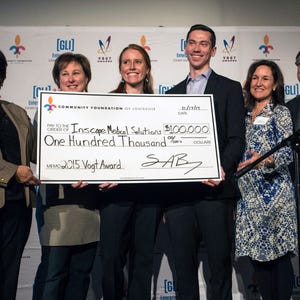Source: courier-journal.com
Industrial hemp is big in Europe, where there's been widespread adoption of sustainable, green materials in manufacturing. This startup is trying to grow a business and a new U.S. industry.
Kentucky's foray into industrial hemp has fueled a Louisville startup which is betting that natural fibers someday will become a key ingredient in hundreds of American-made products - furnace filters, kayaks, skis, even coffee mugs.
Sunstrand was launched by Oldham County native Trey Riddle in summer 2014 after the state of Kentucky's successful push to sanction hemp production.
The company contracts with Kentucky farmers to grow hemp and a cousin crop called kenaf. It's also developed a way to process and coat natural fibers. They are then sold to "upstream" buyers who make pellets for other manufacturers as a drop-in replacement or substitute for more expensive, energy-intensive plastics and glass fibers. Their fibers currently are undergoing trials for creating furnace filters and filaments for 3D printing.
While U.S. manufacturers are still experimenting with such biomaterials, in Europe, the industry is booming. Hemp is used in everything from cigarette paper to auto manufacturing and insulation.
Growing hemp in the U.S. without a permit was prohibited nearly a half century ago because it was classified as a controlled substance related to marijuana. Both plants are the same species, Cannabis sativa, but hemp has a tiny amount of THC, the compound that gives pot users a high.
The federal farm bill allows state agriculture departments to oversee hemp-related research and development. In Kentucky, the state agriculture department noted recently that production is significantly ramping up, from just 33 acres two years ago to more than 4,500 acres planned this year. In 2015, the state reported 900 acres in production.
University of Kentucky's David Williams, an agronomy professor, and Richard Mundell, an agriculture production research specialist, have been working with Sunstrand and other companies that are delving into hemp.
Sunstrand's focus on getting a quality crop and coating it for industrial uses is impressive, Williams said in a phone interview.
"The work they're doing is unlike any in the country, even the continent," Williams said. "They have embraced this potential opportunity. ... I think it's a very, very positive thing."
While there's a green and sustainable cachet surrounding hemp and other biomaterials, Riddle said, the key to building demand is proving to the marketplace that their fibers can cut costs and provide a legitimate alternative to man-made products. There's little dispute that they cut weight of products, which is highly valued by automotive and appliance makers.
"There's a big opportunity in automotive," said Riddle, 37, a mechanical engineer who lured two colleagues in Montana to join him in starting the company.
Located in a small warehouse off Fern Valley Road in south Louisville, the place is packed to the ceilings and overhead doors with plastic-sheeted enclosures and equipment from the textile industry, which the engineers have modified and tested for processing bales of hemp and kenaf.
There's also a lab where Riddle, with production manager Patrick Flaherty and Josh Burton, director of special projects, have developed coatings and conduct tests.
Since they're rapidly outgrowing their main facility off Fern Valley Road, their plan is to find a bigger space later this year and potentially set up a second plant in Canada, where the government has encouraged the company to pursue an incentives package.
Riddle, a South Oldham High School graduate, worked as a cook and a welder before earning a bachelor's degree in mechanic engineering at Montana State. He received a master's degree in the same field from Cornell University in 2009, then returned to Montana State to complete doctoral studies funded by the federal Department of Energy. His Ph.D. work focused on mechanics of polymer composites in wind turbine blades.
The work involved developing a process to treat bamboo fibers. And along the way, he picked up on the excitement surrounding biomaterials. No other company in the U.S. is both growing natural materials and processing them for industry, Riddle said.
He moved from Bozeman, Mont., back to Kentucky a little more than a year ago to locate the operation close to its customers and growers. The state also has been aggressive about boosting Sunstrand with research and development backing with a total of $1.9 million in state and federal grants.
Most crucial has been Kentucky's favorable hemp legislation that allows the companies like Sunstrand to sign a memorandum of understanding with the agriculture department to allow it to keep working on its products.
It also competed in the Vogt business accelerator program last year, winning $20,000 to take part in training with fellow entrepreneurs. Although the company didn't win the $100,000 grand prize in November, the recognition raised the company's profile and gave them exposure to the local entrepreneurship community, Riddle said.
Greg Langdon, a well-known adviser to the Louisville startup community, said that Sunstrand's approach has been "well calibrated" to establish the quality of their raw material before they try to scale up. "They've been smart to understand that the company will have to go through some intermediate" steps before pushing growth, Langdon said.
For now, Flaherty and Riddle said, Sunstrand's team is excited to be part of something that holds huge promise. Within three years they hope to max out their current capacity of 6 million pounds per year. Within five years, their goal is to build a major facility to turn out 25 million pounds annually.
Even their early-stage work has generated a buzz. "In the natural fibers industry," Flaherty said, "we've become the experts."
Reporter Grace Schneider can be reached at 502-582-4082 or by email at gschneider@courier-journal.com.

Kentucky's first hemp crop under trials permitted by a new federal law is growing across the state.Greg Hall, The Courier-Journal

No comments:
Post a Comment